Energy can be up to 80% of a compressor's lifetime cost in many recycling plants. If your compressed air system isn't right, you are spending too much money and risking production downtime when you can't afford it. An underperforming air compressor not only drives up your energy bill, but it also puts your fast-paced sorting, conveying, and baling operations, as well as the profitability they create, at risk.
Follow this guide to choose a compressed air system that will improve efficiency, ensure uptime, and provide full regulatory compliance.
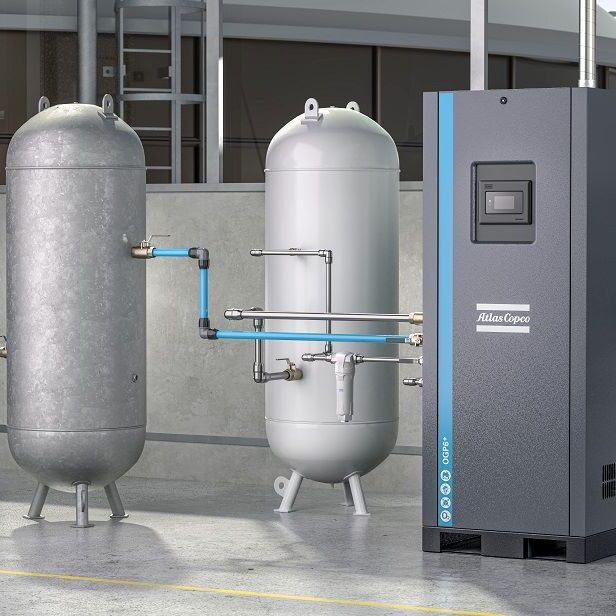
The Critical Role of Compressed Air in Recycling Operations
Dubbed the ‘fourth utility’, compressed air is essential for the automated systems that form the heart of any modern Material Recovery Facility (MRF). A loss of air isn’t just an inconvenience; it’s a total shutdown of your sorting and revenue-earning capabilities.
- Plastics Recycling: Optical sorters utilise tightly controlled jets of compressed air to dislodge different plastic polymers from the main conveyor stream at high speed. A very clean, dry, and reliable air supply is necessary to keep this sensitive equipment – including the optics and solenoid valves it utilises – fully operational. Compressed air also drives pneumatic conveying systems, balers, and cleaning equipment.
- Metals & WEEE Recycling: Sensor-based induction sorters rely on focused bursts of compressed air to remove and separate valuable non-ferrous metals such as aluminium and copper. In Waste Electrical and Electronic Equipment (WEEE) recycling, pneumatic tools facilitate the safe and quick disassembly of devices.
- Paper & Cardboard Recycling: In paper mills, compressed air drives a complex network of pneumatic cylinders and actuators that control everything from valves to rollers. For material collection, pneumatic balers offer a clean and oil-free way to compact materials, without the risk of hydraulic fluid contamination.
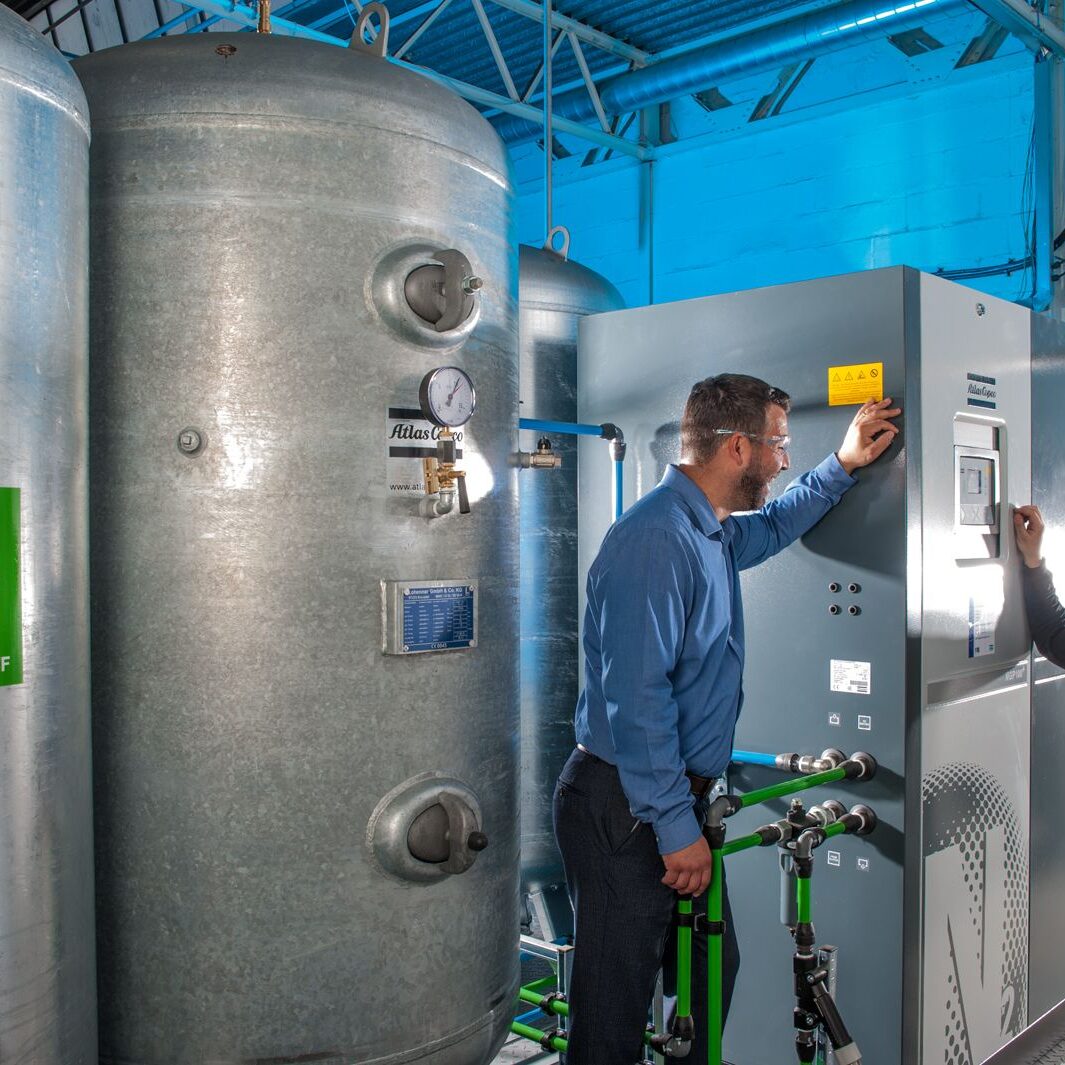
Recommended Atlas Copco Systems for Recycling Facilities
Recycling plants are harsh environments that demand robust and efficient equipment. Backed by nearly 50 years as a Branch of Atlas Copco Compressors, Anglian Compressors provides industry-leading technology engineered to meet the demands of the recycling sector.
Protect Sensitive Sorters with Oil-Free Compressors
To protect expensive sorting equipment and prevent material contamination, an oil-free compressor is the best solution.
- Model: Atlas Copco ZR/ZT Series
- Capacity: 10.4 to 510 l/s (22 to 1,080 cfm)
- Pressure: Up to 13 bar(g)
- Certification: Guarantees 100% oil-free air, meeting the stringent ISO 8573-1 Class 0 standard.
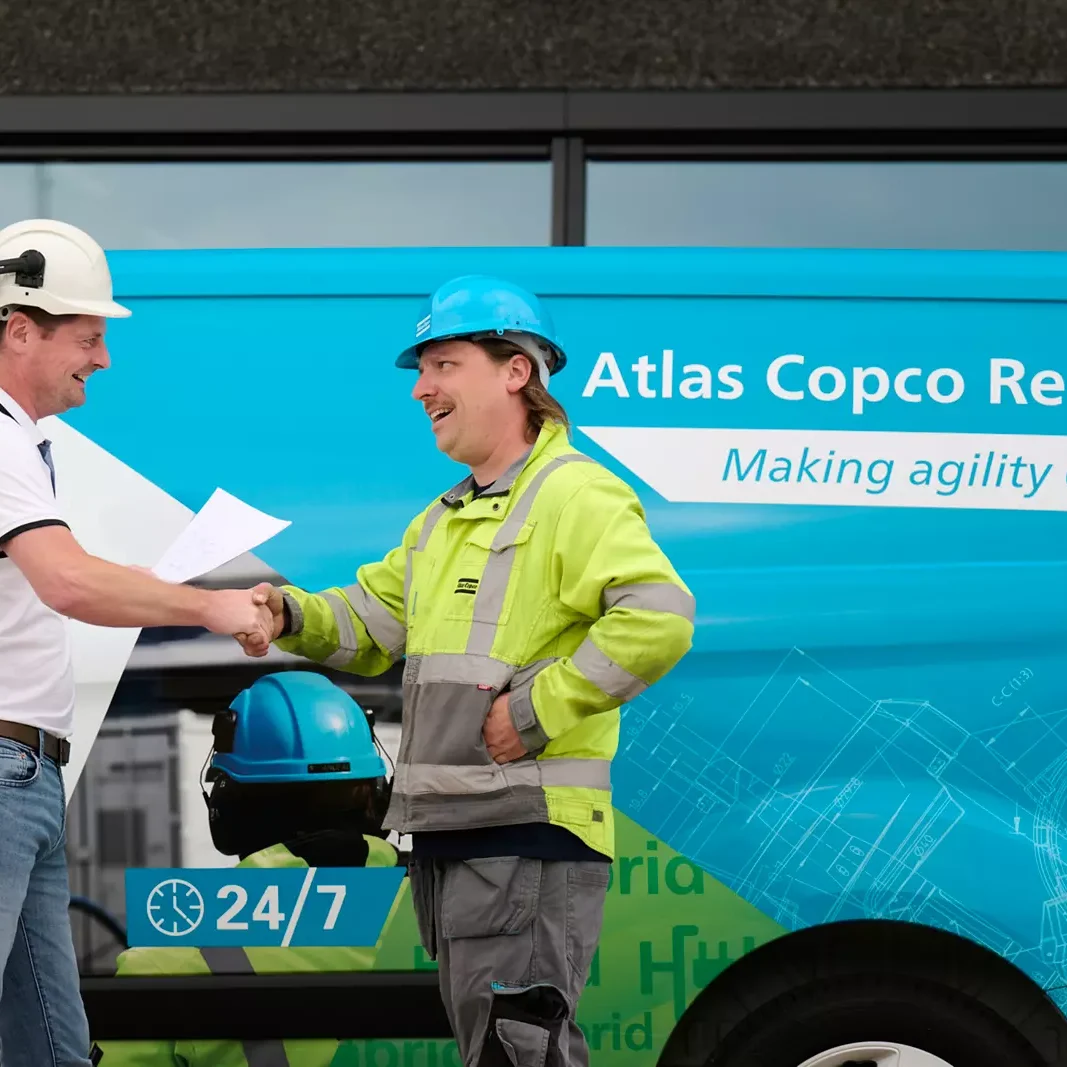
Cut Energy Bills with VSD Compressors
For heavy-duty applications like balers and general plant air, Variable Speed Drive (VSD) technology dramatically cuts energy consumption.
- Model: Atlas Copco GA 5–500 VSD+
- Capacity: 8 to 850 l/s
- Key Features: VSD+ technology adjusts motor speed to match air demand, saving 35–50% on energy. Units are SMARTLINK-enabled for remote monitoring and can be supplied with an integrated dryer.
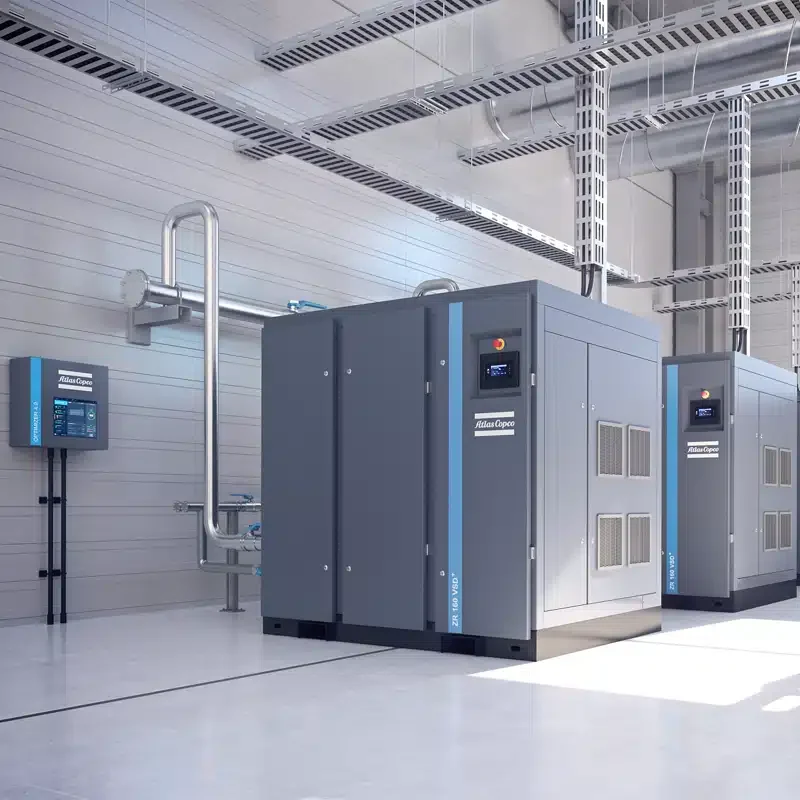
For Low-Pressure Conveying: ZS Screw Blowers
Pneumatic conveying and dust suppression systems are more efficient with dedicated blowers rather than tapping into a high-pressure compressor line.
- Model: Atlas Copco ZS Series Screw Blowers
- Pressure Range: 0.3 to 1.5 bar(g)
- Efficiency: Delivers energy savings of up to 30% compared to traditional lobe blowers.
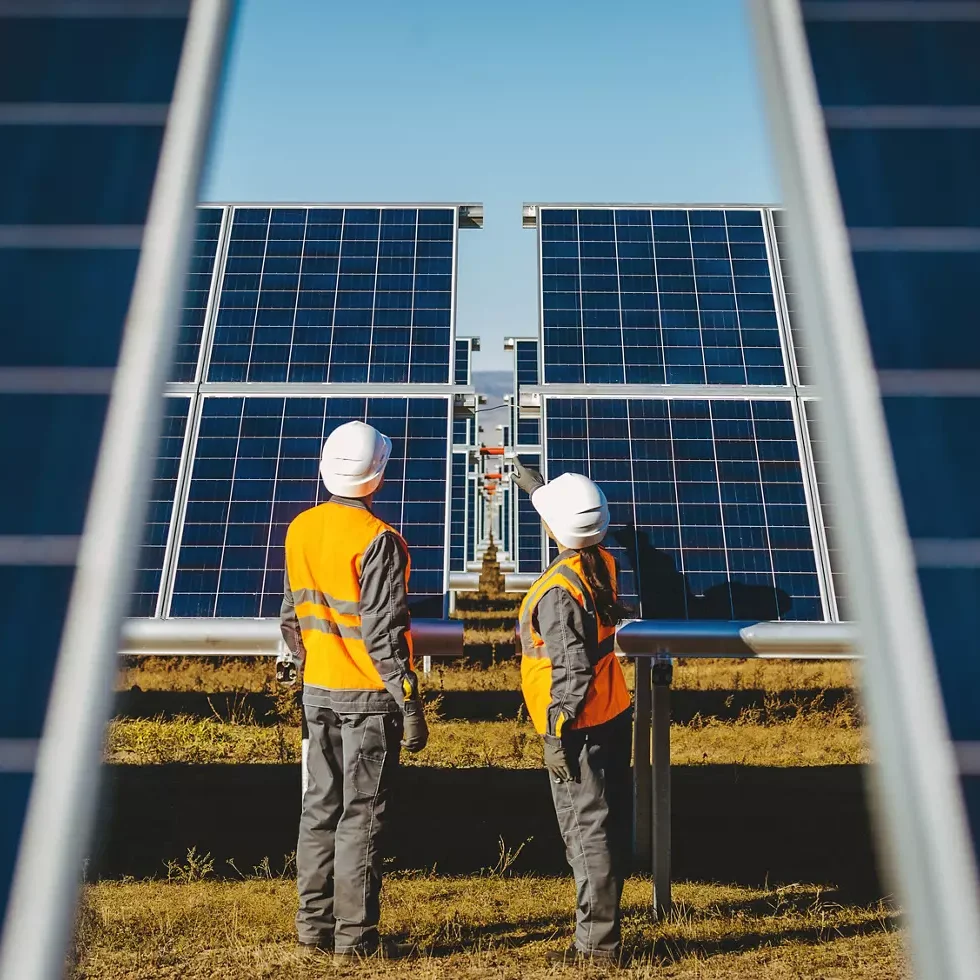
Complete Air Treatment & Modular Solutions
As our engineers have seen in dozens of UK recycling facilities, moisture and dust are the leading causes of premature equipment failure. Our systems are engineered to meet ISO 8573-1 purity classes, protecting delicate optics, valves, and actuators from the dust, oil aerosols, and moisture that cause catastrophic breakdowns. For remote or space-constrained sites, Atlas Copco AIRCUBE stations offer a modular, plug-and-play compressor room in a container.
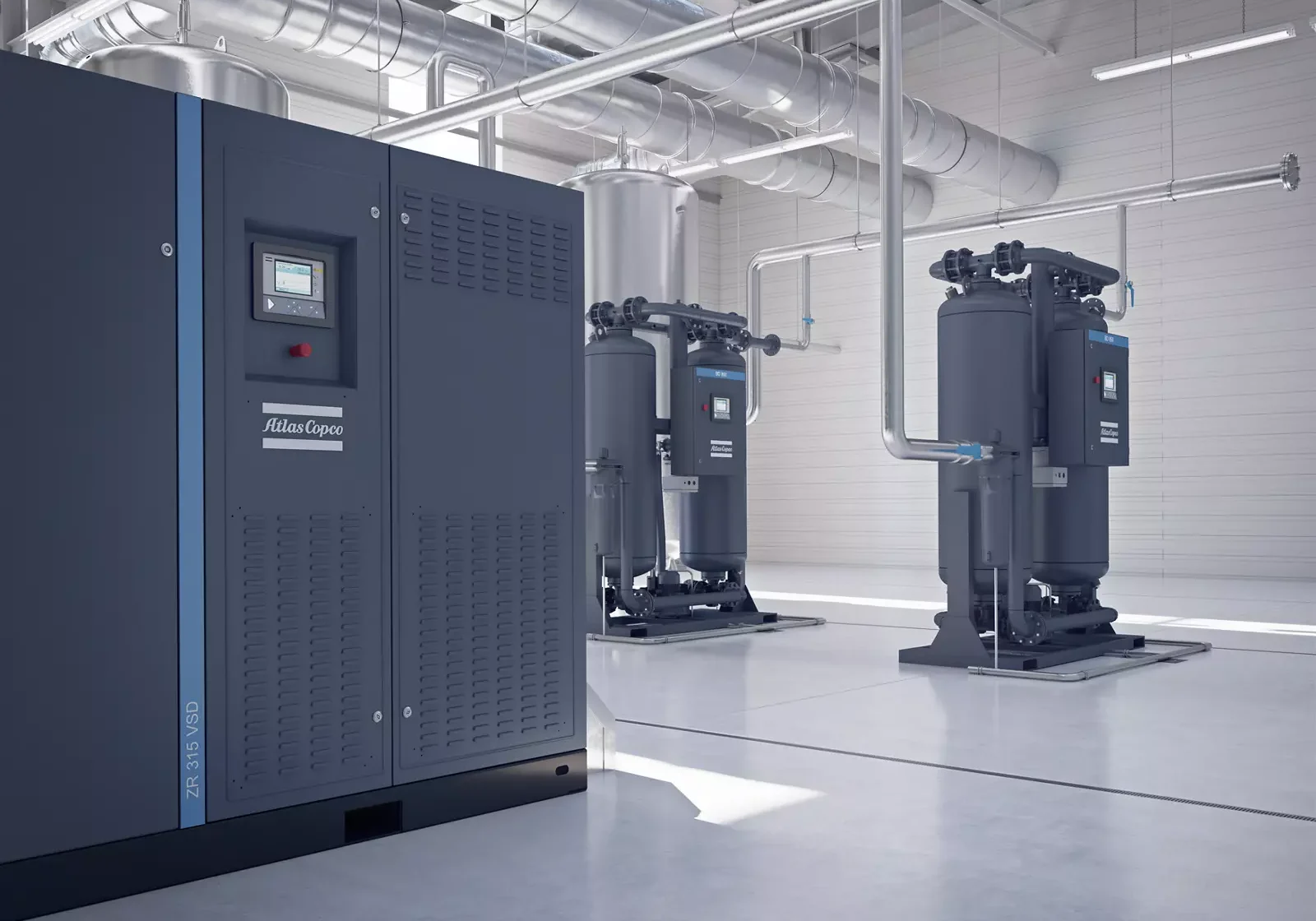

Tackling Operational Costs and Maximising Uptime
A strategic approach to your compressed air system focuses on its Total Cost of Ownership (TCO), delivering a rapid return on investment. For plants running 24/7, an “N+1” design,having a backup compressor ready, combined with our extensive hire fleet, ensures operations never stop, even during maintenance or unexpected failures.
Slashing Energy Bills with VSD and Heat Recovery
Energy often accounts for up to 80% of a compressor’s lifecycle cost. Upgrading to a modern VSD compressor directly addresses this, and the savings provide a rapid ROI that aligns with obligations under the Energy Savings Opportunity Scheme (ESOS).
Air leaks are another hidden cost, wasting up to 30% of generated air. A single 3 mm leak can cost more than £1,000 a year in electricity. Regular Air Compressor Leak Detection surveys and pressure optimisation (just a 1-bar reduction can cut energy use by 7%) are quick wins that compound long-term savings.
Furthermore, up to 94% of the electrical energy used by an air compressor is converted into heat. A Heat Recovery for Air Compressors system can capture this thermal energy and repurpose it to heat water or workspaces, cutting your facility's fuel costs and contributing to your Air Compressor Sustainability goals.
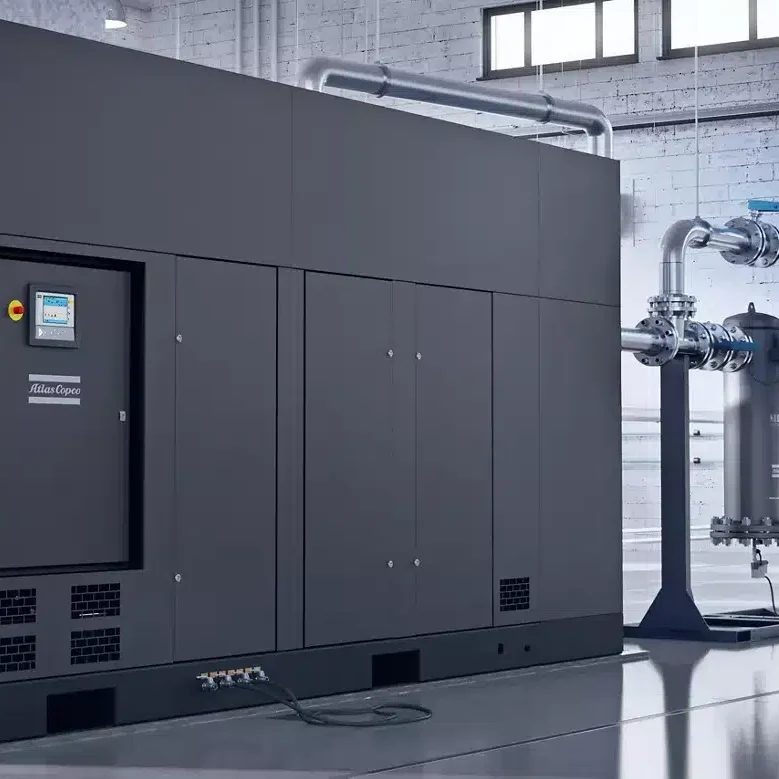

Ensuring Reliability with Predictive Maintenance
Unexpected downtime can be expensive in terms of lost production of thousands of dollars. Today's systems with SMARTLINK Remote Monitoring have real-time information on the health of your compressors, and you can use this information to monitor your compressors on a predictive maintenance basis. By identifying problems as they are developing, before they cause a breakdown, you can schedule the repair for a time that is convenient for you.
Navigating UK Compliance and Safety Regulations
Operating a compressed air system carries significant legal responsibilities. Non-compliance can lead to severe penalties from the Health and Safety Executive (HSE).
- PSSR 2000: The Pressure Systems Safety Regulations 2000 require that any system with a pressure vessel exceeding 250 bar-litres must have a Written Scheme of Examination (WSE) prepared by a "competent person." A standard service contract does not fulfil this legal duty. Anglian Compressors, a Branch of Atlas Copco Compressors, provides complete PSSR compliance packages, including the creation and execution of the Written Scheme of Examination (WSE).
- Condensate Management: The condensate from a compressor is classified as hazardous waste. It is illegal to discharge it into the sewer system without first removing the oil. We install oil-water separators to ensure compliant and safe disposal of oil and water.
- ATEX: Facilities that process materials capable of creating potentially explosive dusts may require an ATEX risk assessment to ensure all equipment is compliant and explosion-proof.

Why Partner with Anglian Compressors, a Branch of Atlas Copco?
The service partner you choose is just as important as the equipment you purchase.
- Local & Responsive: Our Peterborough-based engineers mean 24/7 rapid response right across East Anglia and the Midlands. In an emergency, we will have our engineer with you in minutes, not hours, limiting expensive downtime.
- Atlas Copco Premier Partner since 1977: We deliver industry-leading technology, supported by full OEM service and genuine parts, designed to perform and maintain reliable peak performance. We have the experience and skill to design and service air compressors for recycling plants, providing a system that is tailored to your exact requirements.
- Complete Lifecycle Support: We offer a genuine end-to-end solution, from the design of Compressed Air Piping Systems, through to A Guide to Air Compressor Maintenance and emergency hire service.
Stop Wasting Energy and Start Saving
Don’t let an outdated compressor drive up your operational costs and risk unplanned downtime. A professionally designed compressed air system pays for itself through improved efficiency and reliability.
Book your free Energy Audit for Air Compressors today and let our expert team design a compliant, high-performance system tailored to your recycling facility.
Frequently Asked Questions
A single optical sorter's air jets can require a flow rate from 55 to 325 scfm, depending on the model and application. An air demand analysis is essential for accurately sizing a compressor for a facility with multiple sorters.
